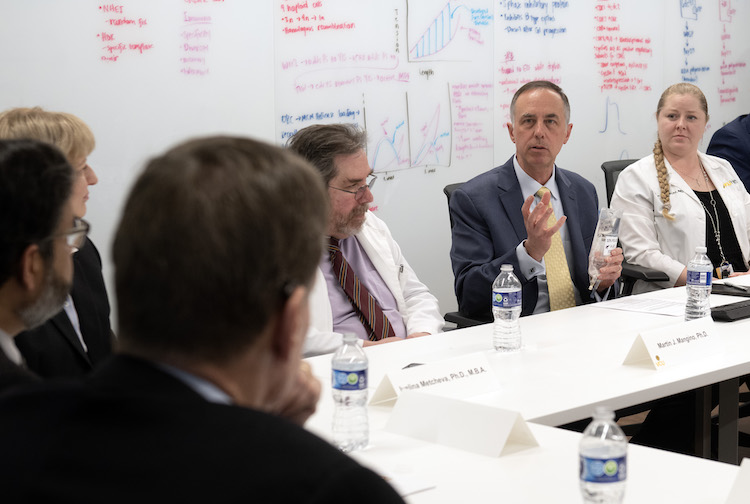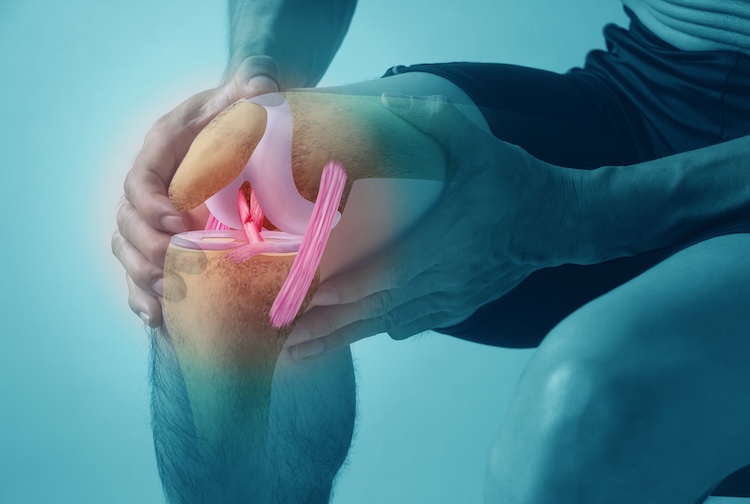Warner tours innovative research space at VCU School of Medicine
With VCU leading industry changes, U.S. Senator sees growth in health science research and business partnerships in the region.
February 01, 2023 U.S. Sen. Mark Warner takes a tour of the VCU School of Medicine's Cottrell Surgical Innovation Suite, where Martin Mangino, Ph.D., conducts research. His findings led to the creation of the company Perfusion Medical. (VCU Enterprise Marketing and Communications)
U.S. Sen. Mark Warner takes a tour of the VCU School of Medicine's Cottrell Surgical Innovation Suite, where Martin Mangino, Ph.D., conducts research. His findings led to the creation of the company Perfusion Medical. (VCU Enterprise Marketing and Communications)
By James Shea and Sara McCloskey
U.S. Sen. Mark Warner toured the Cottrell Surgical Innovation Suite at Virginia Commonwealth University School of Medicine Monday, proudly noting how VCU and Richmond are on the cusp of becoming an innovation hub for the medical industry.
Warner, chairman of the U.S. Senate Select Committee on Intelligence, says health sciences and medical research are becoming priorities for the federal government as matters of national security. One example is the supply chain disruptions during the pandemic impacting distribution of medical equipment and medicine not produced in the United States.
Finding solutions to these problems creates real opportunities, Warner says.
“We don't normally think of [biotech] from a national security standpoint, but I do think that has to be part of the lens,” Warner said. “The more we can do to make Virginia and Richmond specifically that hub, sign me up.”
This moment in time has sparked more support for VCU researchers and creative approaches to industry problems. The National Science Foundation's Higher Education Research and Development fiscal year 2021 survey ranked VCU as No. 50 in the country for fiscal research expenditures, making it one of the top public research universities.
“As a top 50 public research university and the rate at which VCU's research enterprise is growing, we have a lot of big momentum going on right now,” said P. Srirama Rao, Ph.D., vice president for Research and Innovation at VCU.
VCU is leading the way in innovation and entrepreneurship in the region. Over the past decade, 60 startups have been created through VCU research and patents. Around 50% of those companies are still in business. Providing a framework to support researchers to find ways to build companies out of their work is one of the opportunities the university continues to explore and wants external partners to invest in.
“VCU has what it takes to make Richmond a health innovation and biotech hub, but we can't do it alone,” Rao added. “We will need additional assistance from the state and federal agencies and others, to further advance these technologies to the next stages, so that these early startups can attract the necessary investments to move them further along towards the market place.”

Gerard Eldering, CEO of Perfusion Medical, shares with U.S. Sen. Mark Warner some of the challenges facing the company. ((VCU Enterprise Marketing and Communications)
Seeing innovation up close through partnerships
The School of Medicine's Cottrell Surgical Innovation Suite was packed with eager eyes on Monday. Warner, his staff and VCU team members were learning more about a company developed within these walls, spun out of VCU-created technology based on the research of Martin Mangino, Ph.D., professor in the Department of Surgery at VCU School of Medicine.
Mangino developed PEG-20K, a solution that helps open the smallest blood vessels in the body, known as capillaries, when a person is losing blood. The research, funded through grants totaling $12 million from the U.S. Army, also led to the formation of the company Perfusion Medical, Inc.
“We knew [this discovery] was important, so we formed a company,” Mangino said.
It's beneficial for Perfusion Medical's lab space to be located in close proximity to VCU Medical Center, as the product could be used in clinical care settings, such as organ transplant surgeries or urgent care. PEG-20K can also prolong the life of an individual who has been involved in a car accident or other traumatic events.
Mangino says having the lab within an academic health system is a plus for students, who can witness the whole process it takes researchers to develop a product that can save lives.
“Our goal is to train future scientists,” Mangino said.
The U.S. Army also expressed interest in using PEG-20K on the battlefield. The company is looking to begin testing in clinical trials, but has faced some obstacles.
One of those challenges, Perfusion Medical CEO Gerald Eldering says, is getting federal approval. Some people have inquired about using the product in the war in Ukraine, but the company is currently prohibited from doing that until PEG-20K is cleared by the Federal Drug Administration (FDA).
It's also a hurdle to get funding, Eldering told Warner. While the company received support from the National Institutes of Health (NIH) and the federal government, Perfusion Medical is still looking for a way to raise additional funds to sustain its research.
Continued investments provide more opportunities for success
Predicting the future can be challenging, but Marlon Levy, M.D interim CEO at VCU Health, says the key to success is collaboration. Those in healthcare fields, researchers and the government can work together to move the health sciences and medical research industry forward in Central Virginia. Levy says smart regulatory relief can really help.
“Ultimately, a health system like VCU Health is the end user of all of these ideas,” Levy said. “Because, at the end of the day, we all want products such as PEG-20K to get to market to benefit patients. The School of Medicine with its faculty that come to the table with such innovations are critical partners.”
Access to funding over the past 30 years has changed quite a bit. During a round table discussion, Warner noted how Virginia companies had limited access to early stage federal funding for these projects. In recent years, money to support these initiatives has come from the U.S. Department of Defense.
Warner noted that health sciences and medical research have not been a priority for state and federal governments, but he sees that changing.
Highlighting the Creating Helpful Incentives to Produce Semiconductors (CHIPS) and Science Act of 2022 and recent infrastructure bill, Warner says the federal government is looking at ways to speed up the regulatory process for innovative research solutions - and should do something similar for health sciences.
“Success breeds success, and that breeds future success,” Warner said.




